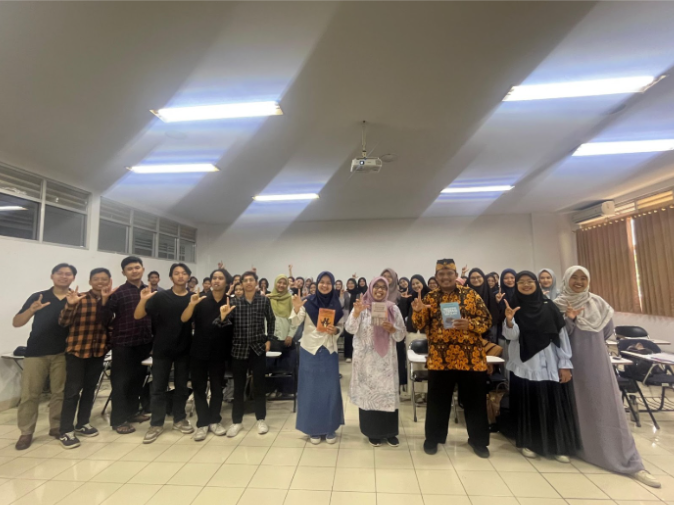
Yogyakarta, September 29, 2025 – The Arabic Study Program, Faculty of Cultural Sciences, Universitas Gadjah Mada, continued its Entrepreneurship lecture series with the fifth meeting featuring Sofian Munawar, S.S., M.A., Founder of Ruang Baca Komunitas. In this session, students were invited to explore the concept of social entrepreneurship, a business approach that prioritizes solving social, environmental, and community issues through innovative and sustainable methods.
The lecture highlighted that social entrepreneurship is not merely profit-driven but instead focuses on social missions, innovation, sustainability, and generating real impact for communities. In the context of literature and language studies, this can be applied through creative literacy initiatives such as reading and writing workshops, digital literacy development, promoting a reading culture, and expanding public access to educational resources.
Students of the Arabic Study Program were also introduced to various examples of social entrepreneurship practices, both globally and locally. Inspiring cases such as Grameen Bank in Bangladesh, Warby Parker in the United States, and Indonesia’s National Literacy Movement showcased how social enterprises can improve quality of life while fostering independence. Locally, best practices from Yogyakarta were presented, including CV Agradaya Indonesia, which promotes sustainable spice farming; Yayasan Penyandang Cacat Mandiri, which empowers people with disabilities through woodcraft; and Sayur Sleman Academy, which trains young agripreneurs. These examples served as both motivation and inspiration for students to see the potential in their own fields.
The lecture also addressed the challenges facing literacy movements, such as limited resources, lack of student motivation, and barriers to technology access. However, students were encouraged to view these challenges as opportunities for innovation through collaboration among schools, families, and communities. This perspective reinforced the idea that literacy is not confined to classrooms but is brought to life through community activities, local culture, and digital platforms.
Through this session, Arabic Study Program students not only gained a conceptual understanding of social entrepreneurship but were also challenged to develop real initiatives rooted in literature and language that could bring tangible benefits to society. This lecture also aligns with the Sustainable Development Goals (SDGs), particularly SDG 4 (Quality Education) by strengthening literacy movements, SDG 8 (Decent Work and Economic Growth) by fostering social enterprises that create meaningful jobs, and SDG 10 (Reduced Inequalities) through inclusive community empowerment programs.
[Arabic Literature, Muhammad Ardiansyah]

